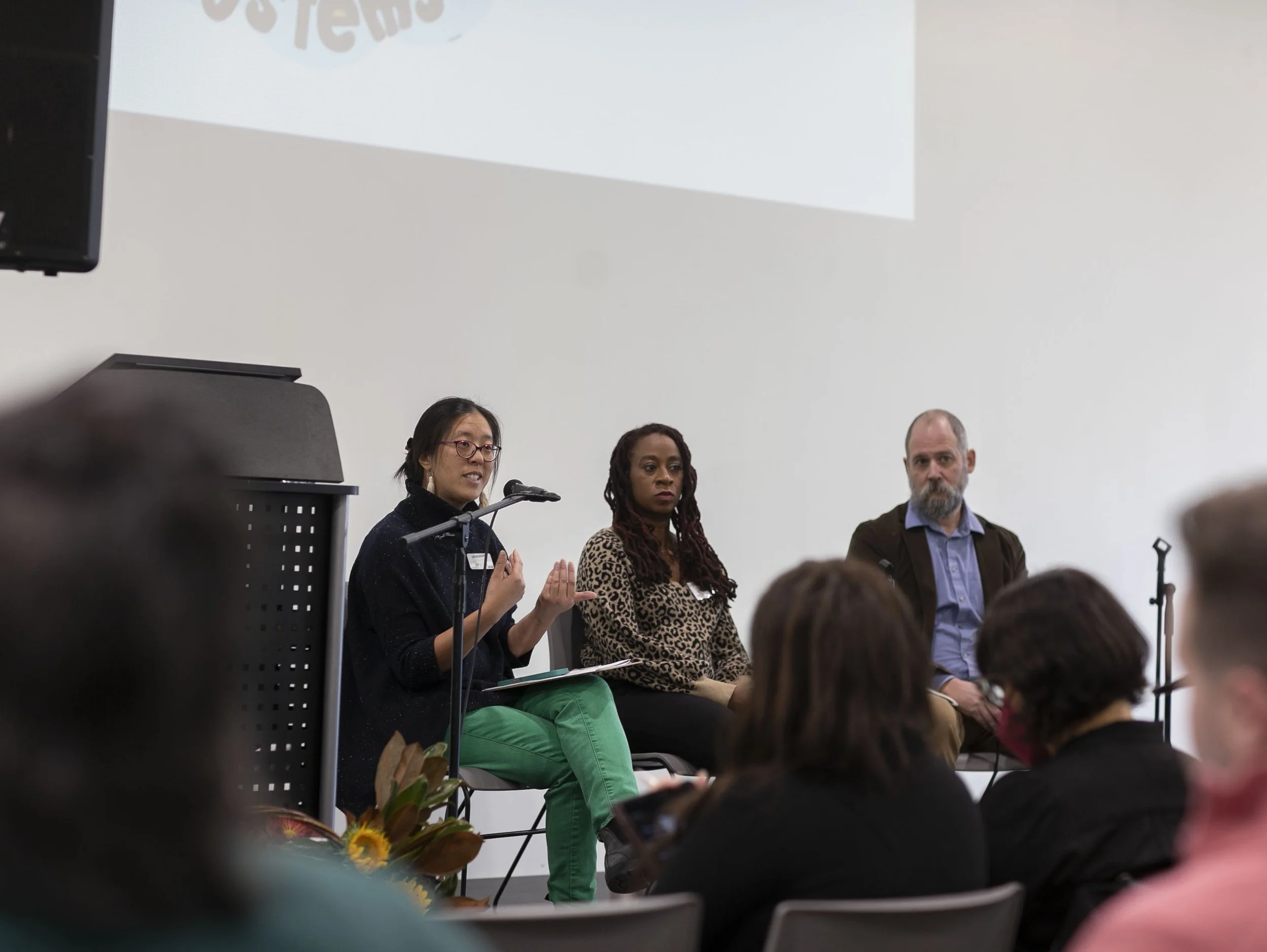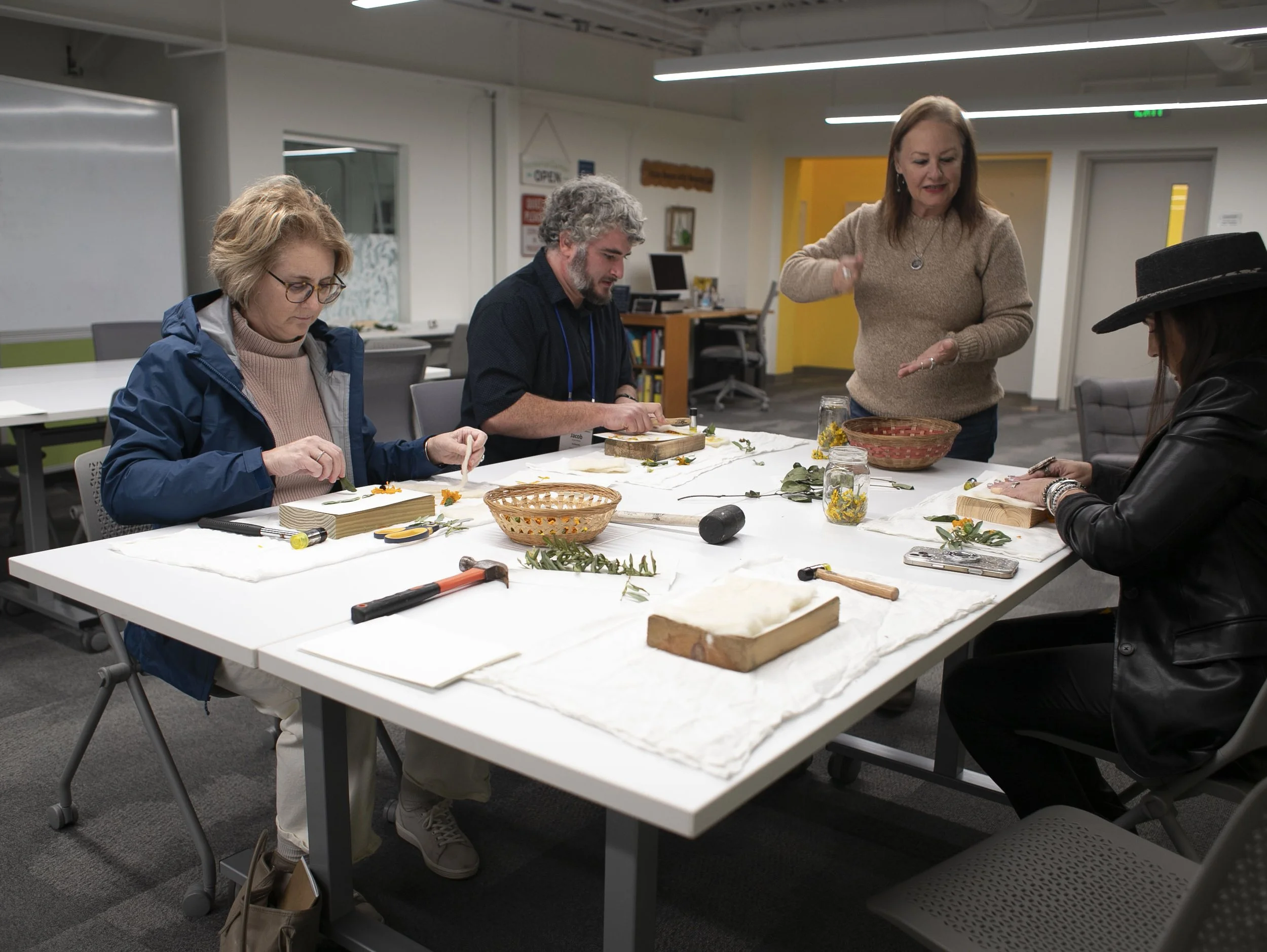Supporting the Source: Resourcing Local Creative Ecosystems
David Mura
One of the preconference sessions on October 19th took place at Springboard for the Arts’ community hub in the historic Frogtown and Rondo neighborhoods of Saint Paul, MN. Springboard for the Arts’ executive director, Laura Zabel, and Mica Lee Anders, founder of Anders Genealogical Services, lead the session’s opening and grounding. Anders is an award-winning genealogist who has done extensive research on the Black community in Rondo, many of whom were displaced due to the construction of Interstate 94 in the 1960’s. Zabel emphasized in her opening remarks that, “Possibility is local. Change is shared.” And a prominent theme for the session was the intersection of arts and community impact.
Image of the panelists from “Making Creative Change.”
The session was divided into four parts. The first part was titled, “Making Creative Change,” and featured a panel discussion between Brad Kik, co-founder and co-director of Crosshatch Center for Art & Ecology in Bellaire, MI, and Ryan Myers-Johson, executive director and founder of Sidewalk Detroit in Detroit, MI. The panel was moderated by Springboard for the Arts’ associate director, Jun-Li Wang.
Wang introduced herself as a community organizer and as such has learned how to get people together and move past differences – this is essential to her work at Springboard for the Arts, which has connected artists to healthcare and markets through their Community Supported Artists (CSA) program and, as the organization has grown over the years, to other economic opportunities such as their Guaranteed Income program. Wang shared Springboard’s belief that artists are at the center of community change. She showed a slide of a cloud with three rings that visualized Springboard’s mission and vision. The outer ring had the words, “Human-centered systems;” the second ring contained the words, “vibrant & just local economies;” and in the center of the cloud was the phrase: “artists are essential.”
Myers-Johson came to her work at Sidewalk Detroit as a movement artist and dancer. She wanted to create site-specific dance performances outside of the theater space that celebrated her hometown of Detroit. What started as an annual Sidewalk Festival in 2013, featuring performance and installation art, has grown to include green equity and climate justice work, such as the work to uplift the 250-acre Eliza Howell Park in Northwest Detroit and other collaborations with the city of Detroit and other partners to expand greenways and other city building projects like housing with community input. The organization created a curriculum on how to engage communities.
Kik founded Crosshatch Center for Art & Ecology in northern Michigan with his wife after attending a Bioneers conference focused on relocalizing. They wanted to remove their dependence on extractive agricultural systems and realized many people were starving for connection and meaningful work. Their first events were block parties to bring people together and build community. From these events, they realized that people wanted to be more competent makers, so they brought people together to learn different skills such as how to prune a fruit tree and later created different artist residencies opportunities like the Long Memory Project, which gathers elders to share their stories with artists who create works inspired by the experience.
Wang asked, “What do you need to resource systems change?” Myers-Johson and Kik both spoke of the importance of trust earned through conversations.
“Funders can ask what’s on our minds. Instead of having us write it all out in a grant, they can come to our office and listen to our vision.”
Kik insisted that granters need to meet the community as well as build relationships and bring together different nonprofits doing similar work by funding convenings and other gatherings. Myers-Johson shared that unrestricted funding allowed Sidewalk Detroit to do research that helped develop their community engagement curriculum and sustainability plan.
The second part of the session was titled, “Finding Shared Priorities,” and featured a conversation between Katie Wehr, senior program officer with the Vibrant and Equitable Communities program at the McKnight Foundation, and Caroline Taiwo, program officer with the Arts and Culture program at the McKnight Foundation. The two found that while they work in different departments at the McKnight Foundation, their work overlapped in many ways. Wehr, with her background in public health, found that the culture of health led to working with culture bearers, and Taiwo’s work with artists and culture bearers addressed such issues as housing and income stability. The two found it essential to work together and share ideas to achieve their goals.
The third part of the session was titled, “Seeds of System Change.” Michele Anderson, Rural director at Springboard for the Arts, spoke about Springboard’s Rural Regenerator Fellowship, a two-year fellowship that brings together rural artists, creatives, and culture bearers to deepen their relationships, grow their work and support rural exchange and solidarity across the Upper Midwest. Fellows receive a $10,000 unrestricted stipend, two in-person retreats, support for Fellow exchanges, and participation in Springboard's annual Rural Futures Summit. Anderson then introduced 2023-2024 Rural Regenerator Fellow Kyle Mesteth from Pine Ridge, SD and 2024-2026 Rural Regenerator Fellow Alejandra (Alex) Sanchez to speak about their work.
Mesteth is the CEO of Ground Control, a skate park on the Pine Ridge Reservation that provides a space where skateboarders, artists, and creators come together to dream, collaborate, and bring their visions to life. “Our mission is to inspire self-expression, fuel innovation, and build a community that pushes boundaries in art and movement.”
An image of attendees participating in Sanchez’ natural dyeing workshop.
Sanchez is the textile artist and shepherd behind A Woolen Forest Farm located in Mondovi, WI. The farm’s focus is the conservation of endangered heritage sheep breeds and the preservation of ancient textile practices. Sanchez was born in Mexico and sought textile arts as a way to connect with her ancestry and feel rooted in her homeland. Her work in textiles encourages folks to connect with the land and its animals and to view their wool-craft as a form of stewardship and a piece of living history. She teaches classes on wool spinning, wool processing, natural dyeing, heritage breed studies, and historically-based textile practice.
Sanchez was one of the workshop leaders for the fourth and final part of the session where attendees participated in mini-workshops. Sanchez’s workshop was, “Dye Flower Pressing on Wool Felt.” Other workshops included screen printing with Sean Lim and tours of Springboard's building that showcased the impacts of artist-led community and economic development with Springboard’s community development director, Ricardo Beaird. It was wonderful to end the session with an art-making activity, engaging and celebrating our creativity!


